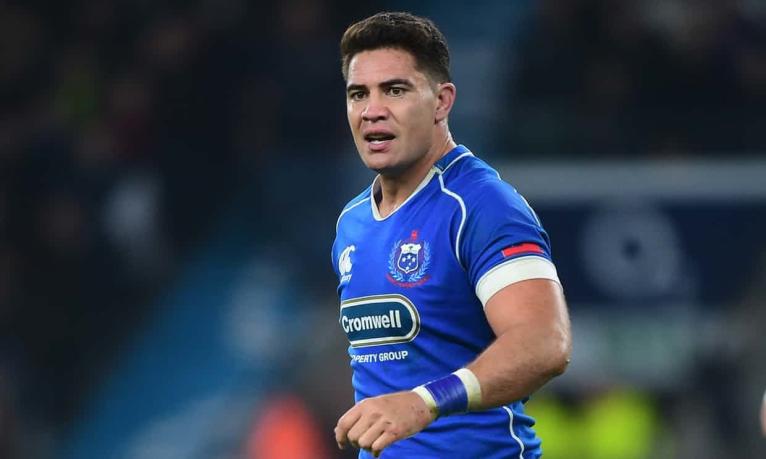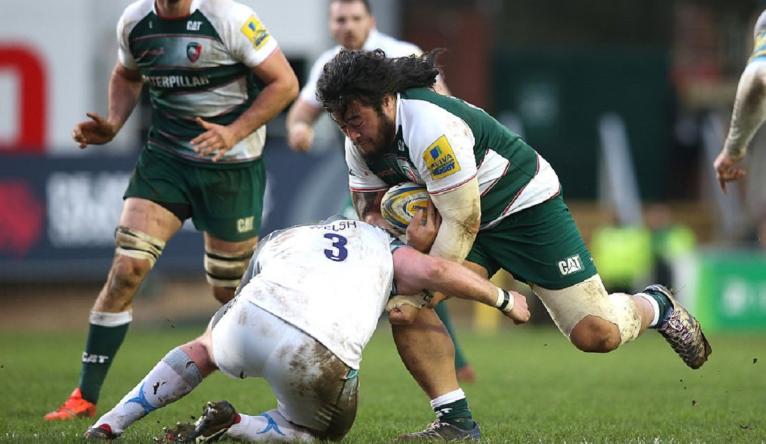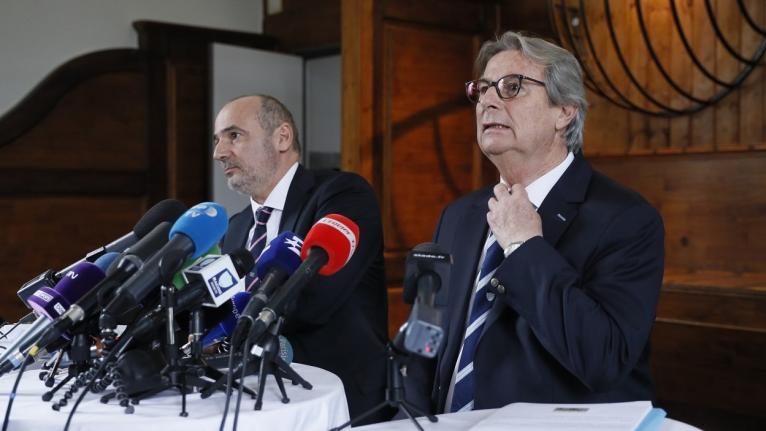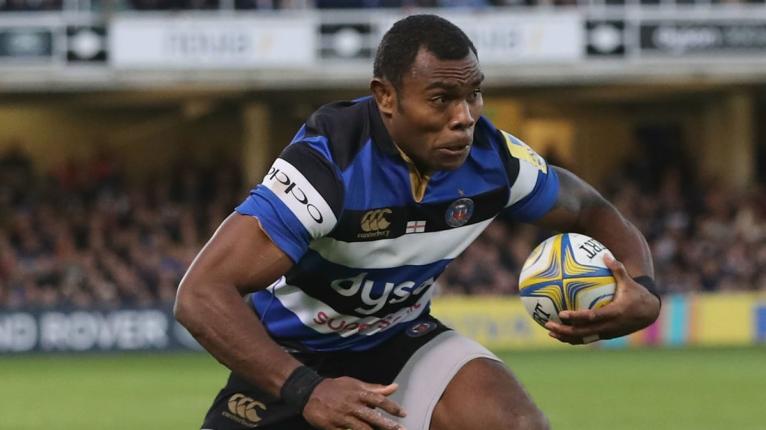"I'd love for the PRPW not to need to exist" - Dan Leo on the untold tragedies of Pacific Islanders in Europe

When Dan Leo set up Pacific Rugby Players Welfare in 2016, he had no idea that just a few months later he would be mourning the loss of one of the players that the PRPW was created to help.
In November of 2016, Fijian prop Isireli Temo committed suicide in France, whilst playing for Tarbes in the country’s third division.
The life of a rugby player can seem glamorous from the outside, but without the support many people take for granted in their day-to-day lives, it can be a lonely place, especially in the lower tiers of professional and semi-professional rugby.
It’s that absence of support which Leo has dedicated himself to combatting with the PRPW.
https://twitter.com/pacificwelfare/status/1039533494978977793
“I came over in 2005 to the UK and by the time I ended my career at London Welsh in 2016, the number of Pacific Islanders playing in the Premiership had doubled. It wasn’t just in the Premiership, but also the leagues below the top tier. If you look at the stats now, in the second division in France there’s a massive reliance on Pacific Island players. If you go down below that, to Federale 1, it increases again, but the further down you go, the less protection there is around players.”
“Obviously, the salaries decrease and though the players at the top of the game, in the Premiership and Top 14, have good agents who will pick up the phone if the player has an issue and they’ll have good support networks around them, if you go below that level, players are struggling. There is this expectation on Pacific Islanders to send money home and they put that pressure on themselves. It weighs as heavily on those guys in the lower divisions as it does on the guys in the top divisions, despite the fact they’re barely making enough to live on themselves. It’s one of the reasons we wanted to put the support system in place to help players deal with those challenges, both the financial pressures and the cultural differences they experience when they arrive.”
“From the most basic things, like helping guys acquire driving licences and getting their kids into schools, something which just seems like common sense and relatively easily, but it’s difficult if you’ve never had to do that in an English or French-speaking country before and you come from tiny islands.”

“One of the big triggers behind setting up the PRPW were the tragedies within the community.”
“We had the suicide issues and we had a Tongan player in France who passed away during training and his family couldn’t afford to get his body back to Tonga. We’ve had a couple of incidences where players’ wives have passed away suddenly and they’re having to look at the possibility of burying their wives in France, but when they finish their careers, they’re going to go back to the islands, and in our communities it’s important that we are buried on the islands and around our family. These are just a few examples, but it was things like these that were causing stress and we were finding that there were lots of incidences where players needed assistance and support.”

Since being established in 2016, the PRPW has run a number of programs and initiatives designed to make the lives of Pacific Island players in Europe easier, looked out for their welfare on and off the pitch and actively pursued elements within the game that seek to take advantage of their situation.
“It’s not just about helping the players’ mental wellbeing, but also extraneous factors that affect their lives, such as holding agents to account. You hear stories about agents exploiting players, so we needed to get ourselves set up as a sort of watchdog in those situations and we feel like we’ve had quite a lot of success in that area. Players are able to get in touch with us and because we’re independent of World Rugby and all the other associations, we can call things as we see them, without being beholden to anyone other than our members.”
“It helps now that agents know we are looking, and all a player needs to do is to tag us into an email. As soon as the agents know that someone is looking, which they weren’t doing before, we can start holding people to account if we believe that needs to happen.”
“Honestly, there’s not a whole lot of trust in the islands for agents. If you look at some of the guys in the lower leagues, like Romania, Spain or the third and fourth divisions in France, they can be on contracts worth 12k-18k euros and the agents won’t go near them because there’s no money in it, so the player might just have a direct contract with the club itself, probably just on an A4 piece of paper. They may have been recruited via one of a number of websites that act as middlemen, connecting players with clubs, or even directly through social media. This is where we need to step in and offer help with our legal services, providing them advice and support, wherever they may need it.”

Away from the advice the PRPW provides in terms of finances, legislation and other material concerns, Leo and his organisation have spearheaded an approach of mental wellbeing with their players that is not only unique in European professional rugby, but also taps into the rich culture and history of the Pacific Islands.
“For us, we take a different approach to how we address issues in our communities. In our gatherings, we always meet around food and we always have the whole family involved, which are the two key elements in our culture. This helps the players relax and when they are relaxed, they open up more about their issues.”
“A lot of our work is done in players’ homes, too, rather than sitting around a table at a club and we find that in our community players can be one person at a rugby club and then a completely different person out of that context. I talk to team managers who say a player never says a word at the club, but then we’ll see videos of him on Facebook with his family and he’s the life of the party.”

“Ultimately, it’s our attempt to use our culture to help us breakthrough with the players.”
“Initially, we just had meetings with players and we quickly realised there was an element missing without the wives or the kids there. Often, that is part of the story. We don’t see ourselves as a players’ association, but as a family.”
“The wives and girlfriends that come out here with the players, they can often struggle more than their partners. Players go to training every day, they have a purpose and they have a ready-made group of friends at the club, whilst the wives are often left at home and they can struggle more with the social isolation. Rather than looking at the player themselves, we have to look at it as a family unit.”
“The social events we put together we try to do regionally, to bring together all the families in those areas. The first two or three hours of any meeting is just social and having lunch, so that the families can make those connections. The cooking process is a big part of it, too, and one of the things that players raise with us is that they feel a disconnect from their culture back home, so the players build the umu [Samoan cooking pit] and prepare the food which, again, is a big part of our culture. The kids partake in it, too, and that gives the families a sense of them passing on their cultural identity to their kids, which is something they can struggle with over here.”
“Then, at the end, we like to talk about some of the issues which affect us as a community and give the players a chance to talk about the challenges they face personally.”
“We talk about a lot of issues. One example is the tightening of contractual law in France that is going to see a reduction in the number of foreigners in the Top 14. It’s something that’s going to have a significant impact on the 400 or so Pacific Islander players currently playing in France. We predict that 13% of those will be struggling to find a new club at the end of this season and that’s a lot of players coming out of the game, who are potentially going to need a lot of support.
“We also try to give them advice on getting their residency, if they’ve been there for five years, so that they can access things like social welfare and healthcare. It seems like common sense but it’s surprising how often that is just not on their radar. It’s an education process that we try to achieve at these meetings.”
One of the key next steps for the PRPW is to take that education process to the clubs and help create an environment that is as conducive as possible for the players and their families, as well as looking outside of the game to improve the lives of their members.
“We have a really good relationship with the clubs in France. The president at Lyon hosted us at the club and it was the same in Paris, where Jacky Lorenzetti came to the meeting. Again, the same at Biarritz and Perpignan. I think they’re really buying in, because they know if they can sort this out then they will get the best out of the players.”

“I spent six months with the RPA doing cultural awareness workshops with the 12 Premiership clubs and that’s something we’d love to roll out in France. The key difficulty for us is that we don’t come under the International Rugby Players’ Association banner, but that’s purposefully so.”
“We don’t want to put our agenda into conflict with other associations’ priorities, because the Pacific Island situation is so different to any other and I think it could be more of a hindrance than a help. One example is that we rely on connections and a relationship with the church. The church is a ready-made community in a lot of small villages and towns across Europe and we are about to formalise and announce an agreement with Sports Chaplaincy UK, which would allow us to directly put a player in touch with a nearby chaplain when he arrives in the UK and that would provide a huge support base.”
“Because the IRPA receives funding from World Rugby and World Rugby is a secular organisation, we wouldn’t be able to tap into the services the church provides if we came under their funding umbrella, so for us, with probably 99% of Pacific Islanders practicing the Christian faith, it would be reckless and crazy of us to conform to a body where we couldn’t tap into spiritual-based services.”
“We are also building strong links with the British army. We are looking to utilise the support services they provide, as there are about 5000 Fijian families currently in the military. The British military has a proud and successful history of working with Fijian service members and providing them with mental health services, so that’s something we’re keen to learn from and expand on, such as their use of psychiatrists.”

When asked where he would like to see the PRPW go in the future and his hopes for the organisation, Leo could not have been clearer.
“Honestly, I’d love for PRPW not to need to exist.”
“At the moment, there is such a need for it. I don’t think independent groups like the PRPW should need to be coming in and providing this role, there should be an onus on World Rugby to affect the policy change Pacific Islander players need and channelling the funds to provide for their player welfare.”
“Pacific Islanders contribute a heck of a lot to the sport, maybe not in TV rights and attendance figures, but you take the 21 or 22% of players with Pacific Island heritage out of the Rugby World Cup and you don’t have a World Cup.”
“We’re doing what we’re doing on a shoestring budget, so I’d love to get to point where Pacific Islanders have the influence on World Rugby’s Council that we deserve, so that we can have a stronger influence on where funding is channelled, with a portion of that, of course, going to welfare. I envision that taking the programmes and initiatives that we are running to the next level and then the PRPW wouldn’t need to exist.”
“I’d like things to get to the point where we don’t have to be that watchdog, where we don’t have to challenge World Rugby and Brett Gosper on Twitter and where Bryan Williams, who’s just gone into the Hall of Fame, doesn’t have to say, “treat Pacific Islanders fairly”, because that will just happen anyway.”
“We need it to happen because it’s the right thing to do, not because we’re here saying it’s the right thing to do.”




























































